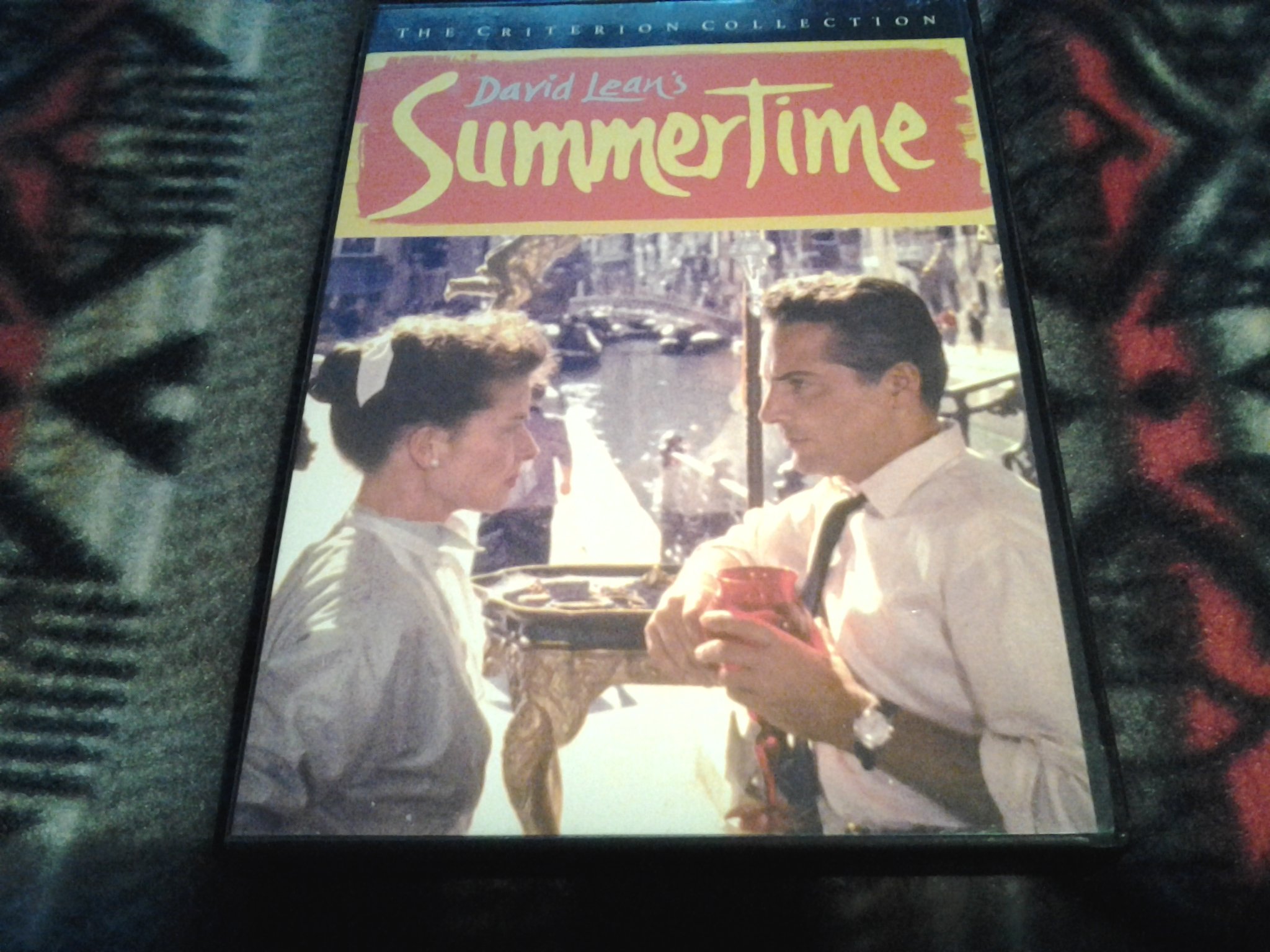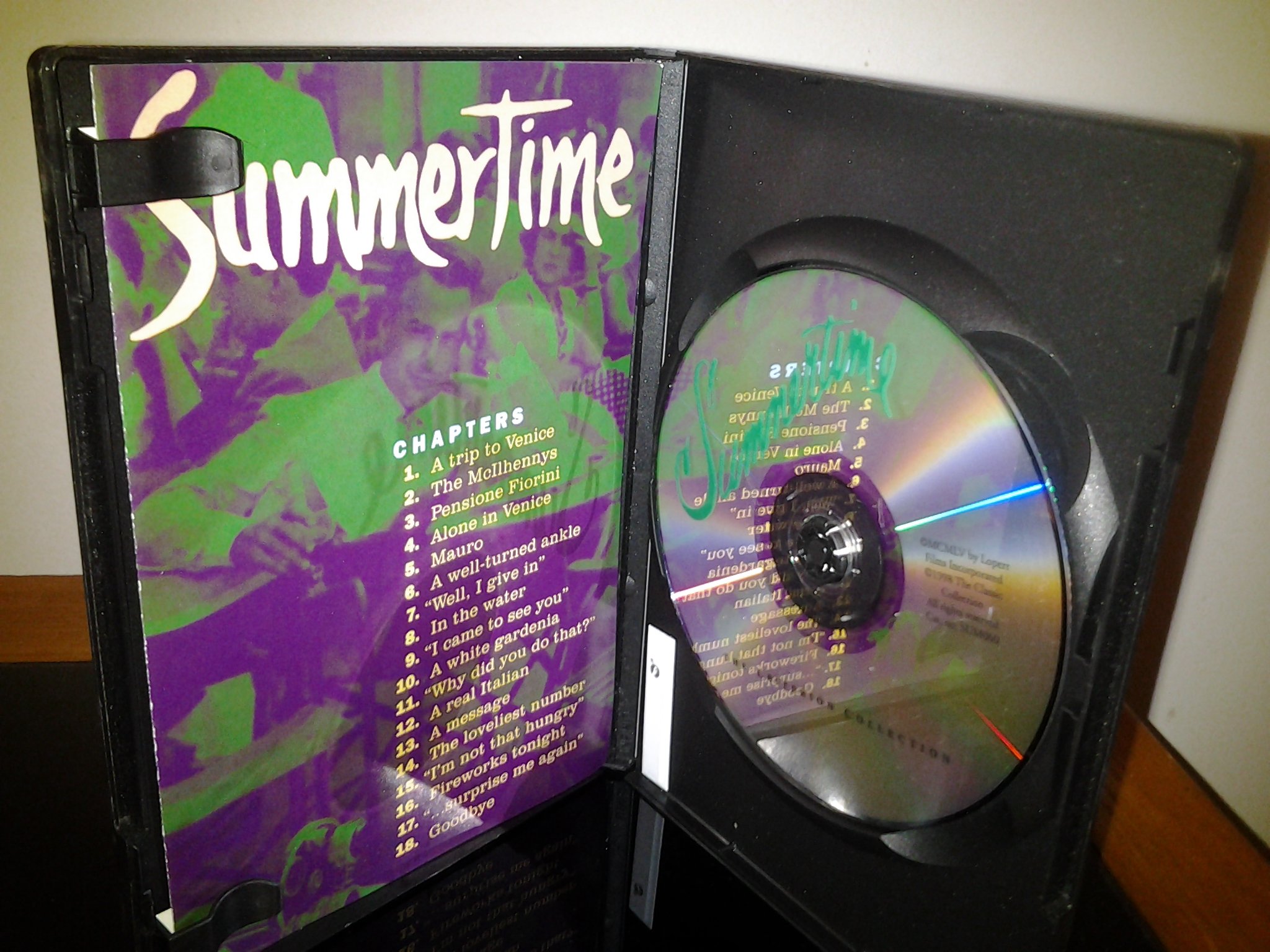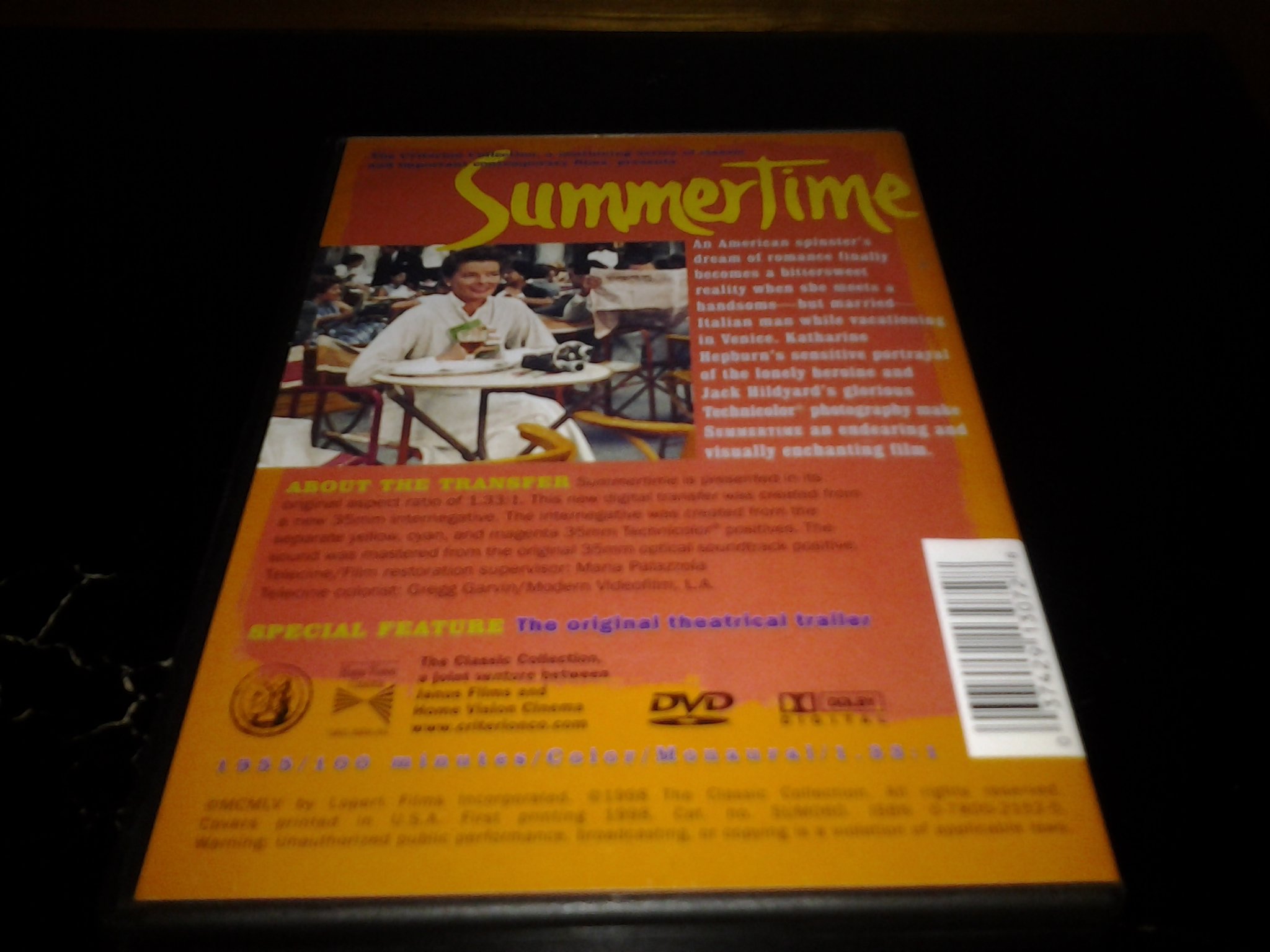



Summertime
C**N
5 rating Quality of product.
5 rating.Pure entertainment.
W**S
Movie
Shipped quickly, and packaged well so it arrived in great shape. Love the movie. A happy customer!
D**.
"FROM SMILES TO TEARS AND BACK AGAIN"
Venice and Katharine Hepburn are both beautifully photographed by Jack Hildyard in David Lean's delicate, 1955 romatic drama "Summertime", based on the play "The Time Of The Cuckoo" by Arthur Laurents ("Rope," "West Side Story", "Gypsy", "The Way We Were"). Laurents' play also served as the basis for the failed, but not forgotten, Stephen Sondheim-Richard Rodgers 1965 Broadway musical "Do I Hear A Waltz?" On the surface, Jane Hudson, a middle-aged woman on vacation in Venice, seems like a typical Katharine Hepburn heroine. Jane is eager and excited by new places and experiences. She quickly makes friends with a dim-witted American tourist and her obnoxious husband (Jane Rose and MacDonald Parke), a boorish artist and his lovely wife (Darren McGavin and Mari Alden), the hotel manager (Isa Miranda), and Mauro, a young boy who becomes her unofficial tour guide (Gaetano Autiero). For a while, the audience is simply content to soak up the sights and sounds of Venice along with Jane. But the most sumptuous surroundings in the world can not hide the deep longing, the terrible lonliness and emotional repression within her. Katharine Hepburn gives an amazingly sensitive, perfectly poignant (and Academy Award nominated) peformance; moving simultaneously from smiles to tears and back again. Jane has clearly come to Venice on a mission. She is searching for some happiness that has been elusive all her life. She is hoping for some "magical, mystical, miracle." What she gets is a brief, but passionate, affair with Renalto (Rossano Brazzi, best known to American audiences for his role as Emile Debeque in the 1958 film version of "South Pacific"), a sexy shopowner who is happily separated from, but still married to, his wife. Jane is both enchanted and offended by Venice, and Renalto forces her to confront all of this. Realizing her deep sadness and repression, he nevertheless scolds her for her prudish attitudes."You Americans are so disturbed by sex," he says. "We don't take it lightly," she responds as her self-defenses crumble. "Then take it! Don't talk it," he shouts. Jane realizes it is ridiculous not to take what Renalto offers her and, as fireworks blaze above them, she does. As David Denby shrewdly observes in his essay in the DVD booklet, "The love affair itself may be formulaic, but Hepburn falling in love is a miracle... "Summertime's" principal drama is Jane's changing state of mind." It is, indeed, pure joy to see Jane relax, smile and really mean it, at last. Jane is sensible enough to know that the affair with Renalto will lead to nothing, and she knows when to leave. But the radiant look on Katharine Hepburn's face as her train leaves Venice (with Renalto unable to give her a goodbye gift) suggests that her brief summer fling was extremely worthwhile. It is a pity, however, that director David Lean moved on exclusively to big epics like "Lawrence Of Arabia." "Summertime" demonstrates his graceful, gentle touch with intimate, personal dramas.
E**Z
Excellent Lean Film
A middle-aged American woman travels to Venice to look for something that is "way back in her mind" and finally, she gets involved with an Italian shop keeper, who is married. The film is exquisite because of the colorful settings. It seems as if Lean had been painting Venice with his camera shots. The film is also subtle. Although Jane, our main character is looking for the picturesque side of Venice, she continues discovering that under this beautiful facade, there is something that her ingenuity's not prepared to receive. First, the way which the carriers that help her with her bags demand subtly their tips; then, she sees a woman tossing trash into the canal; and finally there is the homeless child, Mauro, who is always trying to sell her things for his mere subsistence. Mr. Rasso also signals part of this facade as his 18th century goblet may not be 18th century. Further disappointment affects Jane when she discovers that that her Italian friend is married, and that her host at the hotel goes out with one of her (married) clients. At first, Jane resists to accept these things as normal. However, she will soon discover that she goes to Venice not just to watch beautiful architecture or to ride gondolas. All these things are ephemeral, and we watch her get bored by these things. She wants a real adventure, which can only be fulfilled with this middle-aged man who happens to like her.You will also notice that Jane's desire for the authentic is always in contrast with the WASPish Mclhennys, who attempt to cover Europe in a tight schedule of a few months. This American couple often show disrespect for native Italians and spend most of the time shopping. Mr. Mclhenny's comment that he has seen paintings "done by hand" just shows how ignorant they are. They attempt to connect to local culture by imitating a few Italian phrases and visiting important places.Lean uses images to tell his story. The red goblet is only a reflection of Jane's desires. The goblet, whether fake or not connects her to Renato. Falling in the canal just marks the transition between the old and new Jane. She had been looking for Renato in the shop before falling in the canal. The flower that falls in the canal and that they cannot reach announces that their relationship will not be a lasting one. Later, a red shoe and fireworks will serve to symbolize love making.Finally, Jane returns to America, but not without finding what she had in the back of her mind. Her experience of visiting Venice was meaningful and she leaves satisfied.The film was both, visually stimulating and emotionally satisfying.
Y**
Format was for Canadian use and in English
Previously difficult to find this movie. I have always enjoyed it and the DVD was exactly what I hoped for.
P**I
Jane/Kathe goes back home a new woman.
Born in 1953, I must admit that this movie is, to me, more than just a movie. It's also a historical document of a moment In our history and mentality, both USA and Italy, that have evolved. In the film, too, we see the triumph of the MADE IN ITALY: the Murano glass, Italian shoes, Italian fashion, the traditional coffee bars... Now we have the MADE IN CHINA. Americans in Italy is a subject of many movies - American and Italian productions, especially in the post W.W.2 period, 1955 to early 60s. And SUMMERTIME is just one great example. The scenes are so real that the viewer is drawn into the picture and shares with Jane/Kathe the narrow streets, the canals, the pensione (family-run guest house) where she's staying. Admirably, too, Jane speaks what little Italian she can grasp with the joy of being part of what this city has to offer and wishing to make herself understood; she smiles, weps, enthuses over everything new to her and beautiful: ART, the architecture, the gondolas, capturing the details with her movie camera. BUT has she forgotten anything? She hasn't, she has just suppressed it: the greatest of the emotions that Venice, the summer and the "beau" - actor Rossano Brazzi - aptly and gently can bring out in her: LOVE! And gradually the stiff, American New Englander softens, melts, hugs and kisses. And she goes back to America a new Jane who knows passion and romance. Venice provided the right background for her QUEST. Also stunningly colourful is the final train station scene - similar to and typical of many endings in other Italian movies of the same period: the sultry heat wraps the arrivals/departures, the good-byes, smiles, weeping, last kisses and souvenirs.I bought the cheapest dvd on offer, excellent viewing, but I'm considering buying the BD. A film that is an experience and Katharine Hepburn is just GREAT.
H**R
Un amour d'été
Il fut un temps, avant Laurence d'Arabie et Le Docteur Jivago où David Lean réalisait des films moins ambitieux, plus simples, et cette magnifique histoire vénitienne de voyage et d'amour est l'un d'entre eux--le dernier, en fait, avant que la veine épique ne s'empare de David Lean avec Le Pont de la Rivière Kwai, Oscar 1957. "Parfois je pense qu'un emploi du temps à Venise est, ma foi, hors de propos," fait remarquer une touriste émerveillée à la célibataire en vacances incarnée par Katharine Hepburn au début de Summertime, qui est basé sur la pièce d'Arthur Laurents The Time of the Cuckoo. Avant la fin du film, cependant, Jane aura jeté ses idées romantiques au canal et embarqué dans une aventure passionnée avec un marchant d'art marié. Moins sombre que celle du film Brève Rencontre 10 ans plus tôt, mais non dénuée de culpabilité ou de souffrance, cette histoire d'amour étonnamment simple est un regard souvent fascinant jeté sur une époque où la révolution sexuelle pour les Américaines --et en particulier celles ayant atteint la trentaine--se bornait à de brèves idylles européennes. De plus, entourés par toute l'architecture, l'art, la conversation italienne, la musique, et la bonne cuisine (tout cela richement photographié en décors naturels par Jack Hildyard), qui se plaindra d'une nuit d'amour entre une femme réprimée et un tenant de l'amour libre? Les deux acteurs principaux sont pleins de grâce et d'élégance dans leurs mouvements et leurs dialogues. La révolte initiale d'Hepburn à l'idée que l'adultère fasse partie de cet environnement impossiblement beau peut paraître surranée, mais cette actrice oscarisée sait à merveille suggérer la crainte poignante et profonde que son personnage éprouve de dévoiler ses émotions à quiconque. Finalement Summertime est l'équivalent cinématographique d'un profond et réconfortant soupir de regret.
M**M
Classic Romantic Movie with Katharine Hepburn, Rossano Brazzi, and David Lean
Summertime (1955) is one of those classic movies that makes you want to visit Venice, sit in the Piazza San Marco with a cold drink, see all the sights, and soak in the vibrant night life. Katharine Hepburn (Jane Hudson) is totally convincing as the spinster from the States on the vacation she's saved up for over many years, hoping to inject some excitement and romance into her life. Rossano Brazzi is the handsome antique shop owner, Renato de Rossi, separated from his wife, lonely, and totally charmed by the lovely lady who enters his shop looking for a pair of beautiful red glass goblets.Filmed by David Lean (Bridge on the River Kwai, Lawrence of Arabia, Ryan's Daughter, among others), we see his trademark sweeping vistas and, especially, the intense bustle of the midday arrival in Venice with all the traffic on the canal and the jumble of luggage (complete with travel stickers), contrasted with the softer, cooler, and slower evening scenes as Jane first settles in to her 'pensione', and the lovers meet and begin a tentative relationship with all the complications of a different language, culture, and expectations.Young Gaetano Autiero who plays Jane's guide, Mauro, is perfectly delightful as the street-smart hawker always trying to sell her souvenirs (some of which are totally inappropriate), and ends by giving her a gift at the train station when she's finally tearing herself away from Venice to return to what we believe to be a mundane, lonely existence. It is Mauro who catches the ever-present movie camera when Jane tumbles backwards into the canal while filming the front of Renato's store, and Mauro who catches her changing moods.Hepburn didn't use a double for her canal stunt and paid the price with a dreadful eye infection that plagued her for many years, eventually requiring radical treatment. Thanks to great filming by Lean, we are totally unaware of this while watching the movie and Hepburn gives her characteristically stunning performance. Also, fine acting by Mari Alden and Darren McGavin as the American couple who have settled in Venice, and by MacDonald Parke and Jane Rose as the rather obnoxious American couple who are doing Europe by timetable, unintentionally offending people everywhere as they bumble along.This is a great movie you can enjoy over and over, especially if you're a Hepburn fan, but even if you're not.
R**R
Summertime in Venice
I just got back from Venice & Rome and immediately watched Summertime and was immediately transported back to Venice. This was such a great old movie and I've now seen it 10 times and never get tired of it!. I bought this copy for a friend of mine who had never seen it. I just heard that she loved it big time.
Trustpilot
2 weeks ago
5 days ago